- My Professional Lens
- The Bottom Line, Up Front
- The Core Similarities Between the Two
- Where They Differ
- Side to Side Stack Up
- Pricing and Value for Money
- Rocket Lawyer’s Subscription Model
- LegalZoom’s Flat-Fee Structure
- The Value Question
- Attorney Access: Different Models, Different Expectations
- Use Cases: Who Each Platform Serves Best
- Compliance and Scalability
- Rocket Lawyer’s Approach
- LegalZoom’s Compliance Tools
- Customer Support: Responsiveness and Reliability Between the Two
- Feature Depth Beyond the Basics
- Overall Pros and Cons
- Final Thoughts
Last Updated on September 8, 2025 by Ewen Finser
When clients come to me for advice, legal questions almost always come up. Luckily for them, I know just enough to be dangerous. Whether it’s forming an LLC, drafting a contract, or handling estate planning, most small business owners and individuals face a similar problem: they can’t afford to have a lawyer on retainer, but they also don’t want to risk cutting corners. Therefore, over the years, I’ve worked with many clients who leaned on platforms like LegalZoom and Rocket Lawyer to bridge that gap.
I’ve seen the strengths and shortcomings of both services firsthand. And while each has its place, one tends to offer a steadier, more reliable fit for the long-term needs of businesses.
My Professional Lens
Before diving into the comparison, let me frame this discussion. I’m a CPA with years of experience working with small businesses, and even mid-sized companies that are scaling quickly. Accounting rarely happens in a vacuum, it touches taxes, compliance, liability protection, and business structure. That means I spend a lot of time doing things that aren’t soul sucking spreadsheet work, like evaluating whether a client’s legal foundation can support their financial goals.
That’s why I pay attention to services like LegalZoom and Rocket Lawyer. They’re not substitutes for a full-service law firm, but they’re often a practical starting point, and in some cases, more than enough.
The Bottom Line, Up Front
Both Rocket Lawyer and LegalZoom bring real value to the table. I’ve recommended each at different times, depending on a client’s needs. Rocket Lawyer is practical for freelancers, solopreneurs, or anyone who needs frequent but low-stakes legal templates.
That said, when I look at the bigger picture, particularly the needs of small businesses as they grow, LegalZoom has the edge. Its guided processes, compliance tools, and scalability make it better suited for companies that want stability and long-term support.
From my perspective, I prefer clients use a system that not only solves their problems today but also prevents costly mistakes tomorrow. LegalZoom’s structure makes that easier. It isn’t perfect, but it fits better with the way businesses evolve.
The Core Similarities Between the Two
Both LegalZoom and Rocket Lawyer operate in the same lane: online legal help for people who don’t want (or can’t afford) to hire an attorney for every small matter. These include things like:
- Business formation: Both platforms can set up LLCs, corporations, and nonprofits.
- Document libraries: Each offers templates for common legal needs like contracts, NDAs, leases, wills, etc.
- Legal advice access: Both connect you with licensed attorneys, though the format differs.
- Subscription options: They each have plans designed for ongoing access to documents and legal advice.
From a client’s perspective, both remove barriers. You don’t have to know how to draft an operating agreement from scratch, and you don’t have to guess if you filed your Articles of Organization correctly.

Where They Differ
The real distinction lies in execution and focus.
In my opinion, Rocket Lawyer leans heavily on its subscription model. Clients pay a monthly fee for unlimited access to legal documents and quick consultations with attorneys. This appeals to people who expect to dip into the service frequently.
LegalZoom, on the other hand, offers a broader ecosystem. It feels less like a document library and more like a guided path through key legal milestones. Instead of putting the weight on a subscription, LegalZoom structures its pricing around specific services (like forming an LLC or filing a trademark), then layers on optional add-ons for ongoing support.
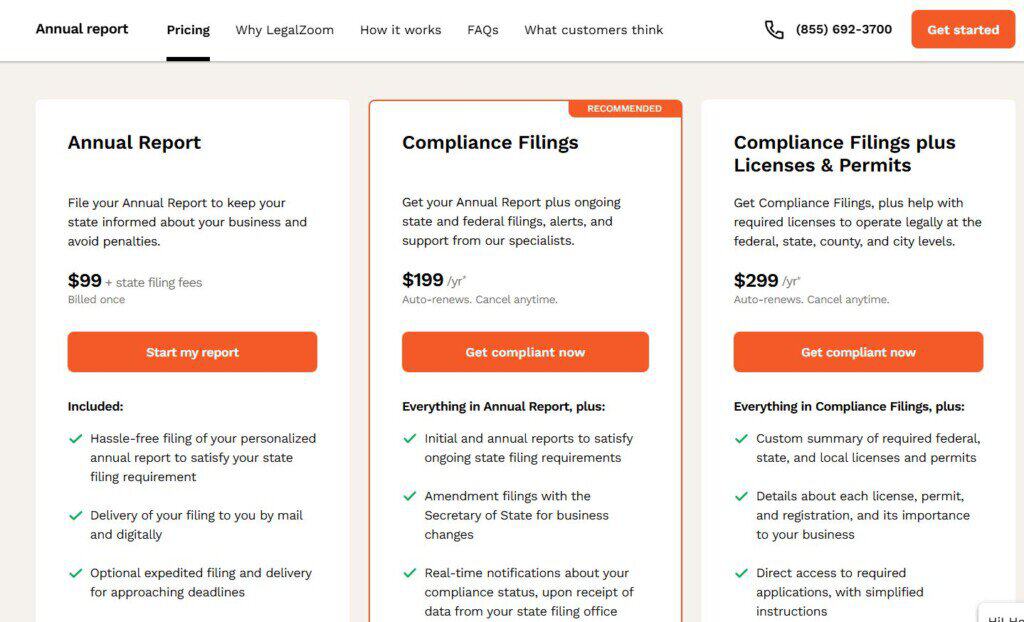
That difference matters in practice. I’ve had clients who tried Rocket Lawyer but ended up overwhelmed by the volume of documents as they didn’t always know which one applied to their situation. LegalZoom’s interface, while not perfect, tends to walk users through the process with more clarity.
Side to Side Stack Up
To distill the differences between Rocket and LegalZoom here’s how I frame it for clients:
- Pricing: Rocket Lawyer favors monthly subscriptions; LegalZoom favors flat fees per service with optional support.
- Document Use: Rocket Lawyer offers broad templates; LegalZoom provides more guided, structured documents.
- Attorney Access: Rocket Lawyer includes ongoing attorney Q&A with its subscription; LegalZoom connects you to attorneys as an add-on.
- Scalability: LegalZoom has more structured services for growing businesses (like trademarks, compliance reminders, and registered agent services).
Pricing and Value for Money
Whenever clients ask me about online legal services, cost is usually the first question. Entrepreneurs, in particular, want predictable expenses they can budget for. Here’s how the two compare when it comes to pricing:
Rocket Lawyer’s Subscription Model
Rocket Lawyer runs on a monthly membership (usually around $39.99 per month). That fee gives you unlimited access to:
- Downloadable legal documents
- Electronic signatures
- Legal Q&A with attorneys
- Discounts on hiring attorneys from their network
This model works best for people who expect to need continuous legal documents or consultations. For instance, an event organizer who drafts a new vendor contract every month may find the subscription cost-effective.
The downside is obvious, though: if you only need a handful of documents or services in a year, the subscription adds up fast. I’ve had clients cancel after a few months because they realized they weren’t using it enough to justify the ongoing cost.
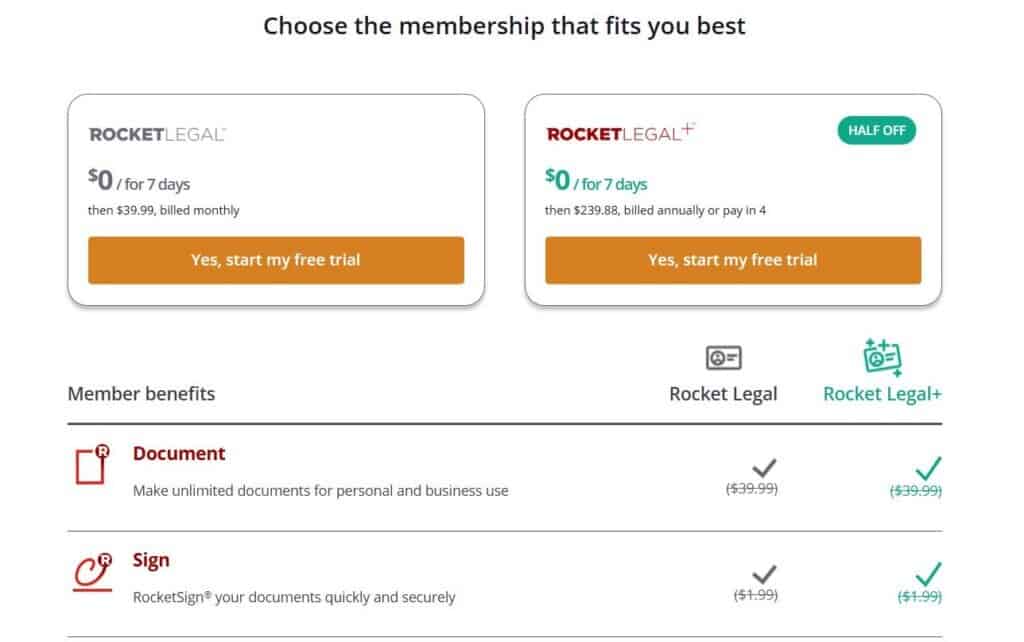
LegalZoom’s Flat-Fee Structure
LegalZoom’s pricing is tied more directly to specific services. Examples:
- LLC formation packages start with a flat fee, plus the state filing fee.
- Wills and trusts have one-time costs, with the option of attorney consultation add-ons. I’ve used this personally to draft a will, and it came out to $119 without any add ons.
- Trademark filing is structured as a project fee, not a subscription.
From an accountant’s perspective, I appreciate the predictability of LegalZoom’s pricing (I detest subscription based services – death by a thousand cuts anyone else?). A small business owner forming an LLC knows they’ll pay once, not be hit with recurring charges they might forget to cancel.
The Value Question
It boils down to use frequency. If you’re constantly generating contracts, Rocket Lawyer’s subscription makes sense. But for most of my small business clients, LegalZoom’s flat-fee structure is cleaner and easier to track on the books.
Attorney Access: Different Models, Different Expectations
Neither service replaces a dedicated law firm, but both offer attorney access in different ways.
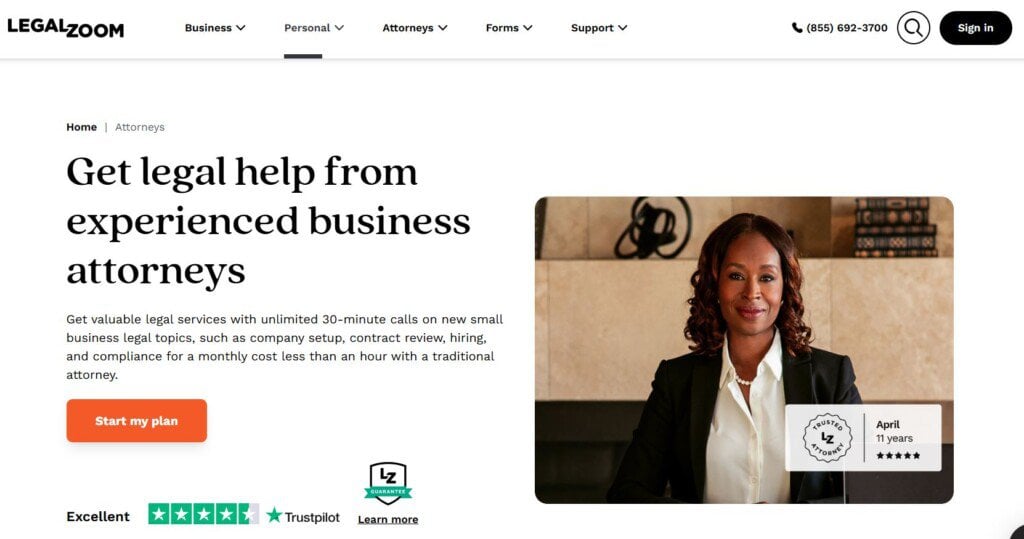
Rocket Lawyer’s On-Demand Access
Rocket Lawyer includes short consultations with its subscription. Clients can ask questions, get quick feedback, or have an attorney review a document. That immediacy is a strong point, especially for small business owners who like reassurance before signing something.
But there’s a limitation: the consultations are often capped, and if your issue is more complex, you’ll likely be referred out at an additional hourly rate. In practice, it’s best for narrow, straightforward questions that can definitively answered.
LegalZoom’s Guided Add-Ons
LegalZoom doesn’t include attorney access in its baseline services, but it offers a network of attorneys you can engage for specific needs. These aren’t just five-minute consultations; you can contract them for ongoing legal guidance and ask them more complex questions as compared to Rocket’s experience, but it will end up costing more in my opinion.
Why It Matters for Businesses
Businesses reach inflection points where they need more than templates. Rocket Lawyer is strong for day-to-day reassurance, while LegalZoom provides a smoother path to more substantive legal help (at the right price, of course).
Use Cases: Who Each Platform Serves Best
Different types of clients gravitate toward each platform. Based on what I’ve seen:
- Rocket Lawyer:
- Freelancers who draft multiple contracts every month.
- Event planners and coordinators with repeated vendor agreements.
- Individuals who want a low-cost entry into attorney consultations.
- LegalZoom:
- Small businesses looking for one-time but crucial filings (LLCs, trademarks, nonprofit status).
- Families planning estates or creating trusts.
- Companies that need compliance reminders, registered agent services, or recurring but structured filings.
For one of my clients, a single-member LLC running a catering business, Rocket Lawyer worked in the early days when she needed repeated contract tweaks. But when she wanted to trademark her logo and expand into another state, she switched to LegalZoom. The platform simply had more infrastructure to support that growth.
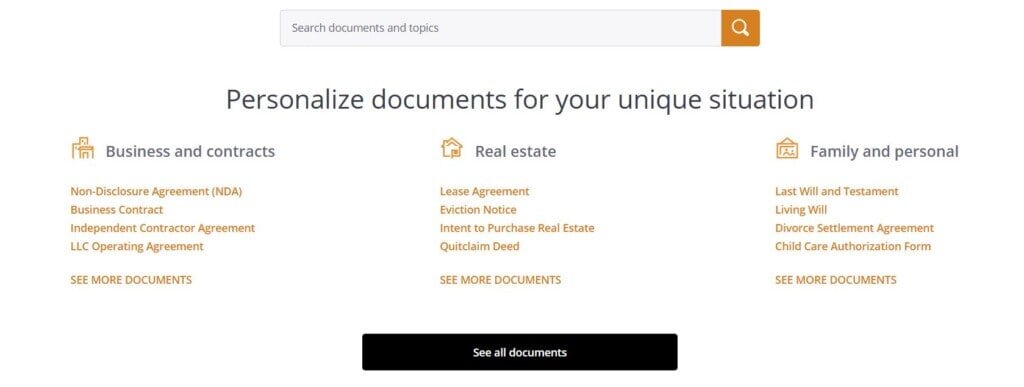
Compliance and Scalability
One area I pay close attention to as a CPA is compliance; to me, it’s a heavy hitter that I often find getting glossed over because it’s not the sexy part of running a business. Clients often underestimate the importance of annual reports, deadlines, and maintaining good standing with their state.
Rocket Lawyer’s Approach
Rocket Lawyer provides access to documents and some guidance but leaves compliance monitoring largely on the client. It’s useful if you’re proactive, but I’ve seen many small businesses forget to file their annual report until they’re facing a late fee (heck, even I am guilty of doing this).
LegalZoom’s Compliance Tools
LegalZoom bakes compliance into its service options. They offer registered agent services, annual report filings, and compliance alerts. To me, this feature is underrated. Clients get peace of mind, and I get fewer panicked calls when the Secretary of State sends a notice.
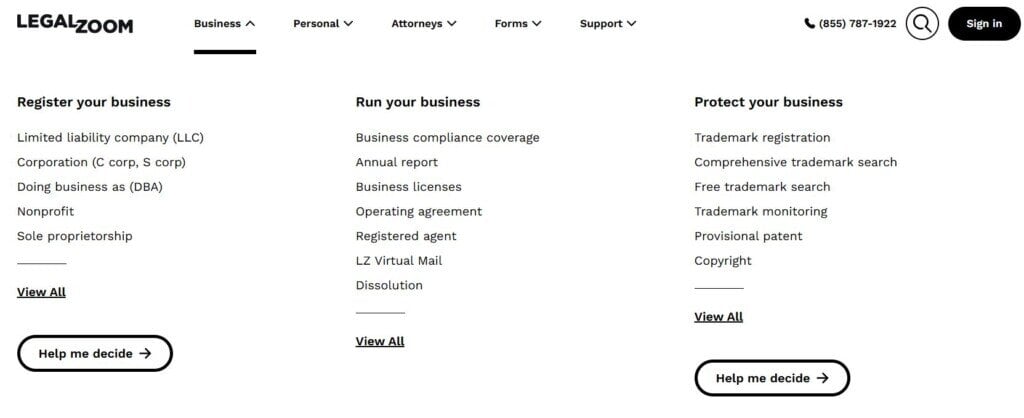
Customer Support: Responsiveness and Reliability Between the Two
Whenever you’re dealing with legal matters, support is not a luxury, it’s mission critical. A missed filing or a confusing clause can have real financial consequences. Here’s how the two stack up:
Rocket Lawyer’s Support
Rocket Lawyer emphasizes quick access to legal professionals through its subscription. For most standard questions, users can reach an attorney within a day or two, and sometimes faster. Their email and chat channels are straightforward, but phone support can feel limited depending on your membership tier.
Clients I’ve worked with appreciated the speed of responses, but I’ve also heard frustrations about the lack of continuity. Each interaction might connect you with a different attorney, which means you may need to re-explain your business situation multiple times.
LegalZoom’s Support
LegalZoom offers phone, chat, and email support, often during extended business hours. More importantly, they have dedicated teams for different service areas like business formation, intellectual property, estate planning, etc. That specialization makes support more targeted.
Takeaway
Rocket Lawyer’s support works well for one-off questions. LegalZoom’s support is more structured, which helps when issues touch multiple areas, like when compliance overlaps with tax planning.
Feature Depth Beyond the Basics
Both platforms cover the obvious: LLCs, corporations, contracts, and wills. But the secondary features are a bit less obvious, and should definitely be compared so that you can get a full comparison between the two.
Rocket Lawyer’s Depth
Rocket Lawyer provides a deep well of document templates. For a small monthly fee, clients can generate hundreds of different forms, from lease agreements to HR documents. This appeals to people who want variety and breadth, but I do wonder how often these businesses need access to the gazillion different forms and templates.
Also, these documents are often generic. Unless you know which clauses matter for your state or industry, you may end up with something too broad.
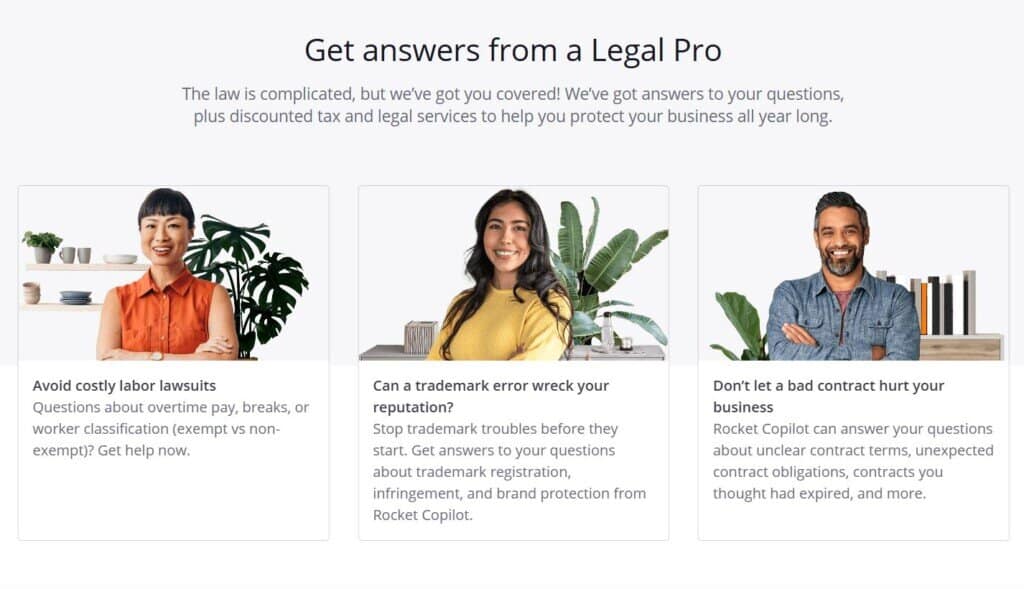
LegalZoom’s Depth
As previously touched on, LegalZoom focuses more on transactional services:
- Trademark registration and monitoring
- Registered agent services
- Annual report filing
- Estate planning with tiered packages
These aren’t just documents, they’re services that ensure follow-through for you and your business to stay out of trouble. For clients who want “set it and forget it” compliance, LegalZoom is better positioned.
Long-Term Business Fit
A crucial distinction lies in how well each service grows with you. Changing software providers for any facet of a business is both costly and time prohibitive, so it’s important to get them right the first time.
Rocket Lawyer’s Fit
Rocket Lawyer is great in the startup stage, when you need contracts, NDAs, and general reassurance. But as a business matures, the subscription model can feel less efficient. A construction company drafting the same subcontractor agreement repeatedly doesn’t gain much after the first few uses.
LegalZoom’s Fit
LegalZoom shines for businesses with long-term ambitions. When you expand into multiple states, file for trademarks, or require ongoing compliance, the platform’s ecosystem makes those transitions smoother. It’s also great that you pay as needed, and don’t need a recurring monthly payment to access these items.
Overall Pros and Cons
Here’s how I summarize it when advising clients:
Rocket Lawyer
- Pros: Affordable monthly access, wide library of documents, fast Q&A with attorneys.
- Cons: Generic documents, less structured support, compliance tracking left to the client.
LegalZoom
- Pros: Great service packages, decent compliance tools, scalable features like trademarks and registered agent services.
- Cons: Add-on costs can stack up, attorney access isn’t bundled by default.
Final Thoughts
LegalZoom and Rocket Lawyer both make legal help more accessible, but they serve different needs. Rocket Lawyer works best for freelancers and individuals who need frequent, low-cost access to contracts and quick attorney Q&A. LegalZoom, by contrast, is stronger for businesses and families that need structured services like LLC formation, compliance reminders, and trademark protection. In my work as a CPA, I’ve found Rocket Lawyer useful for day-to-day templates, but LegalZoom consistently provides the clearer, more scalable foundation for businesses that plan to grow.

